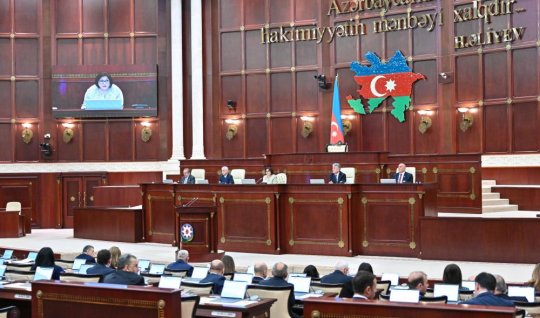To Ramiz Mehdiyev “Grey Cardinal” the nickname who, when gave...

These days, the expression “Grey Cardinal” is frequently encountered in the press and social networks... It is known to everyone whom this expression targets – it refers to Ramiz Mehdiyev, the former head of the Presidential Administration, who is currently accused of treason against the state.
“Grey Cardinals” in politics are generally considered individuals who prefer to remain in the shadows but indirectly exert a very serious influence on processes, capable of directing events according to their own interests. They are valued as politicians who speak little but resolve many things…
Ramiz Mehdiyev has also been one of the key figures in Azerbaijan for many years, shaping both the political system and personnel policy in the scientific and academic environment.
The 87-year-old academic has long been known as a powerful influencer. This context led to an increase in comments describing him as “the power behind the government” and he was dubbed “Grey Cardinal” in political circles.
Who gave Ramiz Mehdiyev the nickname “Grey Cardinal” and when?
There is no unequivocal answer to the question.
Ramiz Anvar oglu Mehdiyev was born on April 17, 1938, in Baku. He has a long and influential career in the fields of science and public administration.
During the Soviet era, he worked in various scientific-political and ideological structures, and held functions in party and communist youth organizations.
From 1995 to 2019, he served as the head of the Presidential Administration; he was considered one of the main founders of state governance, personnel policy, and internal political technologies.
After 2019, he focused on academic activities as the president of ANAS (Azerbaijan National Academy of Sciences).
Although he was one of the main officials in governance, political technologies, and the state apparatus for many years, he did not present himself as a very open politician.
There are several reasons why the nickname “Grey Cardinal” suits Ramiz Mehdiyev's image.
When Mehdiyev served as the head of the Presidential Administration, he was a cabinet official; he worked within the administration, not in the visible part of the state. The policy of “remaining in the shadows” suited his profile.
As head of the Presidential Administration, Mehdiyev influenced significant personnel appointments and was one of the key decision-makers in the internal policies of state institutions.
Mehdiyev's name was mentioned in strategic moments considered important by the public – in election processes, relations with the opposition, and control over media and NGOs.
The nickname “Grey Cardinal” was given to Ramiz Mehdiyev to emphasize his role as a “secret but powerful” influencer in state governance. This nickname largely originated in the media, political commentary, and public discourse. Ramiz Mehdiyev's designation as “Grey Cardinal” began in the late 90s – long after he was appointed head of the Presidential Administration.
As we noted, Mehdiyev was one of the main figures in state administration for many years – as head of the Presidential Administration (1995–2019). During such a long period of activity, his sphere of influence was naturally very wide. Media and political analysts often suggested that he played a role as a background, invisible center of power. The appointments of ministers, deputy ministers, executive heads, and high-ranking officials in law enforcement agencies and the judicial system took place with Ramiz Mehdiyev's blessing. This tendency played a key role in the formation of the “Grey Cardinal” nickname.
Some politicians and public figures also used the expression “Grey Cardinal” in their speeches against him, which accelerated the spread of the nickname among the masses. And gradually, this nickname became widely used in journalistic articles, analyses, blogs, and social media. As a result, the “Grey Cardinal” description solidified as a reference to his management style, his intervention in the formation of personnel power in the background, and his status as an “invisible power.”
In summary, the nickname “Grey Cardinal” was a metaphorical image largely attributed to Ramiz Mehdiyev's personality and management style by the media, political commentary, and public opinion.
But today, Ramiz Mehdiyev is silent. In that silence, it appears that not only has his political position been lost, but also the system of relationships he built over the years has turned against him.
His “Grey Cardinal” status, public influence, and support base have already begun to crumble...
A.Gorkhmaz
-
19:50, Bu günVolkan Demirel resigned
-
19:33, Bu günNetanyahu will not leave politics
-
18:07, Bu günNetanyahu wants to meet with Trump
-
15:41, Bu günRussia has attacked Ukraine - casualties reported
-
14:50, Bu günChina and Russia started joint missile exercises
-
13:26, Bu günThe Ukrainian army liberated this territory
-
11:41, Bu günAccusation from China: Japan interfered with military exercises
-
09:24, Bu günFire at a nightclub in India - THERE ARE FATALITIES
-
6 December 2025, 22:40We have reached an agreement with America - ZELENSKY
-
6 December 2025, 21:40Armenia and Azerbaijan border guards have removed helmets and bulletproof vests - PASHINYAN
-
6 December 2025, 20:00Ukraine no longer believes in empty promises
-
6 December 2025, 19:20“I am a 'Grey Wolf' and I will die this way! - Bağçalı
-
6 December 2025, 17:32In Russia 1 percent of men “DISAPPEARED”
-
6 December 2025, 17:13Negotiations concerning Gaza are passing through a decisive stage
-
6 December 2025, 16:51Will Putin's arrest warrant be annulled?
-
6 December 2025, 14:22Turkey–Azerbaijan energy corridor will provide incredible benefits - US Ambassador
-
6 December 2025, 13:50Horrific accident in Turkey - 6 people DIED
-
6 December 2025, 12:48Second Chernobyl?
-
6 December 2025, 09:15Ukraine's Commander-in-Chief Opposed Territorial Concession
-
6 December 2025, 08:26Students in Germany protested - “We don't want to be soldiers”
-
5 December 2025, 22:15The resolution of the Ukraine conflict is imminent...
-
5 December 2025, 19:43Assad's allies are preparing for rebellion
-
5 December 2025, 17:23Will Turkey open its borders with Armenia in 6 months? - REACTION from Ankara
-
5 December 2025, 16:23Kyrgyzstan wishes to become a member of the UN Security Council - CALL from Leaders
-
5 December 2025, 15:09The time has come for Northern Cyprus's full membership in the OTS - MINISTER
-
5 December 2025, 13:00Putin may meet with Trump - President's aide
-
5 December 2025, 11:44In Paris, Putin's “secret daughter” was found - “I am very sorry”
-
5 December 2025, 11:18AI-powered minister “was arrested”
-
5 December 2025, 11:16He/She, in the WC-2026 draw for Azerbaijan, represents
-
5 December 2025, 09:07Trump's National Security Strategy's priorities REVEALED
























































